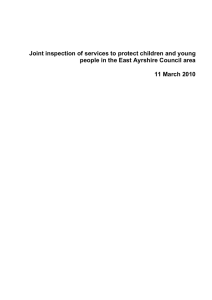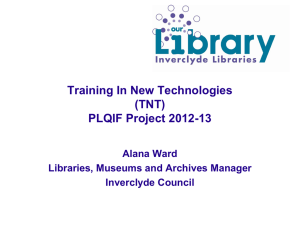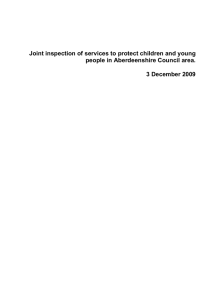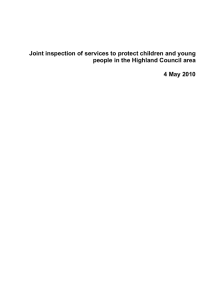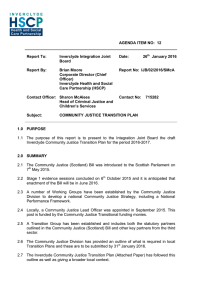Joint inspection of services to protect children and young
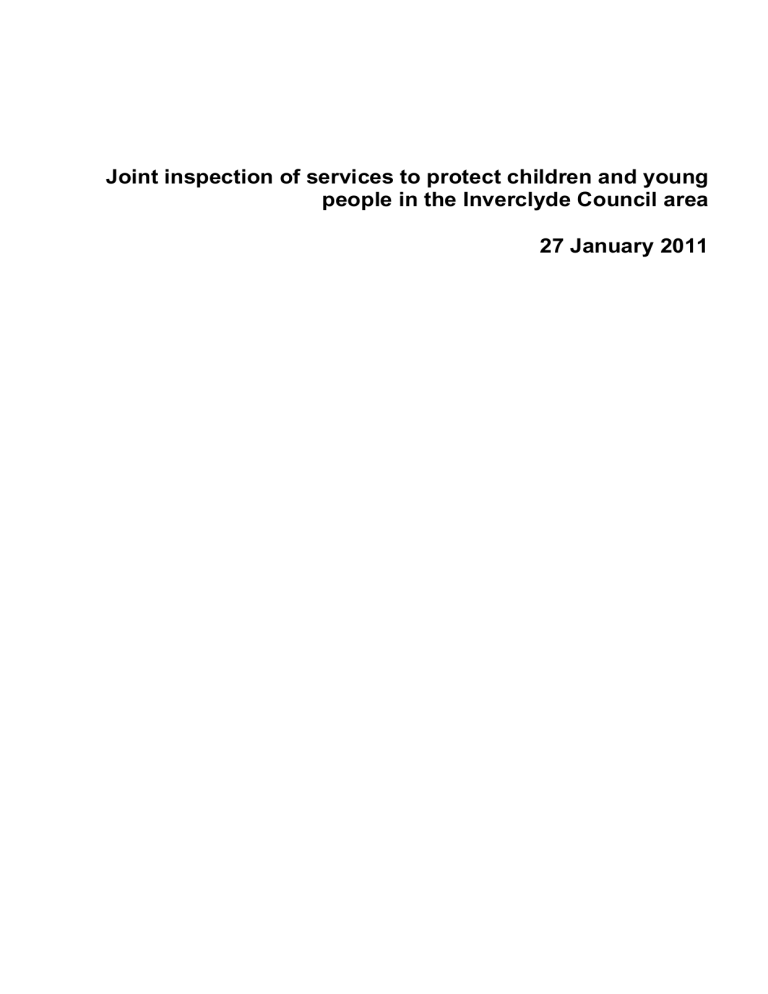
Joint inspection of services to protect children and young people in the Inverclyde Council area
27 January 2011
The inspection of services to protect children
1
in the Inverclyde
Council area was carried out in October and November 2010.
We looked at the services provided by health, the police, the council and the Children’s Reporter. We also looked at the services provided by voluntary and independent organisations.
Our report describes how good they are at protecting children and keeping them safe. To find this out we read a sample of children’s files which were held by these services. We talked to a number of children and their parents and carers to listen to their views about the services they had received. We also spoke to staff in these services who worked with children, parents and carers and to senior managers who were responsible for these staff and the services they provided.
What we found and tell you about in this report is based on a sample of children and families. We cannot promise that this will be the same for every child in the area who might need help.
A team of inspectors gathered all the information and helped to write this report. These inspectors have experience of working across the range of services involved in protecting children.
Inspection teams include professional staff who work in council areas elsewhere in Scotland.
The Care Commission carried out inspections of Inverclyde
Council’s fostering and adoption services linked to the inspection of services to protect children. Any recommendations or requirements are reported on the Care Commission website, www.carecommission.com.
1
When we refer to children in this report we mean children and young people under the age of 18 years.
Contents
1. The area
2. Particular strengths that make a difference to children and families
3. Examples of good practice
4. How well are the needs of children and families met?
5. How good is the management and delivery of services?
6. How good is leadership and direction?
7. How are services improving?
8. What happens next?
1. The area
Inverclyde is one of Scotland’s smallest local authority areas covering an area of 160 square kilometres.
The population is 80,210 with
17.5% under the age of 18 years which compares to the Scottish average of 20.5%. The area has areas of deprivation in parts of
Greenock and Port Glasgow, which contrast with more affluent rural villages.
The number of children referred to the council for child protection enquiries increased between 2007 and 2010. The level of referrals is higher than that for Scotland as a whole. The proportion of children on the Child Protection Register (CPR) in Inverclyde is 2.5 per 1,000 which is slightly below the national average 2.8 per 1,000.
1
2. Particular strengths that made a difference to children and families
•
Children and families have supportive relationships and very high levels of trust and confidence in staff.
•
The Family Placement Strategy is helping relatives care for children and keep them in their own community.
•
Early intervention prevents difficulties emerging for many vulnerable families.
•
Staff take very quick action to protect children and keep them safe.
•
Leadership of the Chief Officer Group (COG) and Inverclyde Child
Protection Committee (ICPC) is improving outcomes for vulnerable children.
3. Examples of good practice
•
Rights Respecting Schools which successfully promotes children’s rights in schools and communities.
•
Improving child focused practice through joint review of assessment reports for vulnerable children.
•
Safety Net Inverclyde has increased awareness of Internet dangers.
2
4.
How well are the needs of children and families met?
Children receive effective help from a range of staff to understand how to keep themselves safe. They usually know how to use the Internet and mobile phones safely. The Safety Net Inverclyde campaign has very helpfully given information to the public to help them be aware of
Internet dangers. Children know who to speak to if they need help or are worried about something. They benefit greatly from learning about their own rights and how to respect the rights of others through the
Rights Respecting Schools programme. Children affected by domestic abuse are supported well by staff who help them talk about their experiences and plan how to stay safe. Services work together very well to ensure vulnerable children are identified as early as possible and are helped to get the best possible start in life. Families, including vulnerable pregnant women and their partners, get useful services quickly to prevent difficulties in their lives happening or getting worse.
Support for children and families who may be at risk of harm is available for as long as needed. A few parents have to wait before they can get additional help to develop their child care skills from
Mellow Parenting programmes.
Staff are very alert to signs that children may be at risk and consistently take prompt and effective action to investigate concerns.
They tell families quickly and frankly about any concerns and explain clearly the action they are taking and what will happen next. In a few cases, assessments of concerns raised about children outside normal office hours could be improved.
Effective use of legal measures by police and social work helps to keep children safe. When children are unable to remain with their parents, staff try hard to find suitable care within children’s own families. They always check to make sure this is safe and provide extra support to family members ensuring children are cared for well.
Where it is not possible for children to remain within their own families, foster carers and residential staff provide high quality care in the short and longer-term.
3
Staff from different services work together closely to plan and provide support for vulnerable children and their families. As a result, children’s physical, emotional and social needs are met very well.
Children in residential or foster care get extra help with their education from specialist teachers. Staff across services clearly understand the difficulties for children who have been abused or neglected or who have had poor quality care in their early lives. They ensure children get the help they need to recover and have more positive futures.
Inverclyde Child Protection Committee (ICPC) has provided helpful training for staff and managers on how to identify children who have been brought into or moved around the country illegally and may be at risk of harm. Staff have clear guidance on how services should work together to trace children who go missing from schools and nurseries.
This includes children moving from other areas who do not then arrive at school. When children who have ran away return, staff make time to listen carefully to them and provide appropriate support to help them. Managers are committed to ensuring the rights of all young people are respected and their needs met, including gay and lesbian young people. They have made information and training available for staff so that they can ensure these young people get the particular help they need.
Children and families benefit from outstanding, open and honest communication with staff. Staff work extremely skilfully and sensitively when parents are finding it difficult to accept help. They persevere with families. Parents understand what is expected of them to keep their children safe and ensure children get the help they need. Staff spend time getting to know children and building up trust and confidence. As a result, they know individual children’s needs exceptionally well and have a sound understanding of their short and long-term needs. Staff always seek children and families’ views. They encourage them to write these down so that everyone involved in making decisions knows what children and families want to happen.
Where children are too young or unable to speak about their views, staff carefully and capably observe their behaviour to make sure they understand how children feel before they decide what is best for them.
4
5. How good is the management and delivery of services?
Staff across services share information very well to protect children.
This includes staff who are responsible for assessing sex offenders who may pose a risk to children. Health staff are routinely involved at an early stage when there are immediate child protection concerns.
They take the opportunity to discuss the need for a medical examination and if this is required it is organised quickly. Some operational police officers need to be more aware of the importance of involving health staff at an early stage.
Robust procedures are in place for all types of medical examinations.
Appropriately trained doctors carry these out in child friendly settings.
The ICPC has recently introduced very clear guidance which helps staff gather appropriate health information when concerns are raised.
A few children had to wait too long for a comprehensive medical examination. Action has now been taken to ensure these are done without any further delay.
The ICPC is beginning to monitor and analyse medical examination activity to ensure children are having their health needs fully met.
Social workers complete initial assessments promptly and to a high standard. Some staff are using dated lists of significant events in children’s lives to help them assess risk very effectively. All staff are becoming more confident in using these lists and the quality of them is improving. Staff across services are working together to complete very thorough and full assessments mostly within agreed timescales.
These assessments usually lead to effective plans to keep children safe and meet their needs. Managers are closely monitoring how quickly these plans are completed and are successfully identifying and dealing with any difficulties.
Senior managers are strongly committed to improving services to protect children. There is an extremely strong culture across services of learning from good practice. There are very effective systems in place to help staff review their work together to achieve the very best outcomes for vulnerable children. They are encouraged to reflect
5
carefully on the impact of their work and to make any necessary changes. Reviewing practice could be improved further by strengthening arrangements for the systematic gathering of views from children and families.
6. How good is leadership and direction?
The ICPC and the Chief Officers Group (COG) have a strong vision for child protection and they communicate this successfully to staff. They promote this vision not just for the present generation of children but through them to the next. Leaders and senior managers across services give effective direction and support to staff in their work to protect children and keep them safe. The Integrated Children’s
Service Plan (ICSP) is based on clear objectives, is easily read and understood and structured helpfully around indicators of well being.
Some aspects of it are being reviewed to give children’s services a higher profile in the community planning process. Staff across services have strong values which emphasise the rights and needs of children. This shared child centred approach helps to ensure that children and families benefit from strong partnership working at all levels. The Inverclyde Community Health and Care Partnership
(CHCP) commenced in October 2010. Staff are confident that the
CHCP will help joint working progress even further and improve outcomes for children in need of protection.
7. How are services improving?
Services share responsibility for strengthening their work to improve outcomes for children in need of protection. Information which is collected across services is used effectively by the ICPC and the
COG. They examine local trends and patterns against national indicators very well. They regularly monitor the progress of actions from improvement plans and agreed targets. There is a very strong emphasis on keeping children within their own family or with relatives, and if neither is possible, with a new family. The Children’s Champion
6
scheme helps to successfully support children who live away from home.
The ICPC has very effective systems in place to ensure that learning from self evaluation, including good practice, is shared with staff to support improvement. Case file audits have helped identify areas for further development resulting in well targeted work to secure improvement in policies, procedures and practice. Improvements to service delivery have resulted from significant resources being given to services to support vulnerable children. This includes the education team supporting looked after children and the mental health worker in schools.
Chief Officers and the CPC have very successfully taken forward actions from the previous inspection. Children’s health needs are now routinely considered and their longer term needs are assessed more effectively. Significant work has been done to implement effective joint assessments which strongly focus on the needs of the child. Services are now continuing their work to further improve planning arrangements for individual children.
8. What happens next?
We are confident that the services will be able to make the necessary improvements in light of the inspection findings. As a result, we will make no more visits in connection with this inspection. Our link inspector will maintain contact with services to support improvements.
7
We have agreed the following areas for improvement with services in the Inverclyde Council area.
•
Build on the successful work already in place to support improved outcomes for vulnerable children and families.
•
Continue to develop ways of monitoring and analysing data about medical examinations to ensure children’s health needs are being fully met.
Quality indicators help services and inspectors to judge what is good and what needs to be improved in the work to protect children and meet their needs. You can find these quality indicators in the HMIE publication How well do we protect children and meet their needs?
Following the inspection of each local authority area, the Scottish
Government gathers evaluations of four important quality indicators to keep track of how well services across Scotland are doing to protect children and meet their needs.
Here are the evaluations of these for the Inverclyde Council area.
Children are listened to and respected
Children are helped to keep safe
Response to immediate concerns
Meeting needs and reducing long term harm excellent very good very good very good
We also evaluated the following aspects of the work within the local authority area.
Self-evaluation
Improvements in performance
Managing Inspector: Joan Lafferty
January 2011 very good very good
8
To find out more about inspections or get an electronic copy of this report go to www.hmie.gov.uk. Please contact the Business
Management and Communications Team (BMCT) if you wish to enquire about our arrangements for translated or other appropriate versions.
If you wish to comment about any of our inspections, contact us at HMIEenquiries@hmie.gsi.gov.uk or alternatively you should write in the first instance to BMCT, HM Inspectorate of Education, Denholm
House, Almondvale Business Park, Almondvale Way,
Livingston EH54 6GA.
Our complaints procedure is available from our website www.hmie.gov.uk or alternatively you can write to our Complaints
Manager, at the address above or by telephoning 01506 600259.
If you are not satisfied with the action we have taken at the end of our complaints procedure, you can raise your complaint with the Scottish
Public Services Ombudsman (SPSO). The SPSO is fully independent and has powers to investigate complaints about Government departments and agencies. You should write to SPSO, Freepost
EH641, Edinburgh EH3 0BR. You can also telephone 0800 377 7330, fax 0800 377 7331 or e-mail: ask@spso.org.uk. More information about the Ombudsman’s office can be obtained from the website at www.spso.org.uk.
This report uses the following word scale to make clear judgements made by inspectors. excellent very good good outstanding, sector leading major strengths important strengths with some areas for improvement satisfactory strengths just outweigh weaknesses
Crown Copyright 2011
HM Inspectorate of Education
